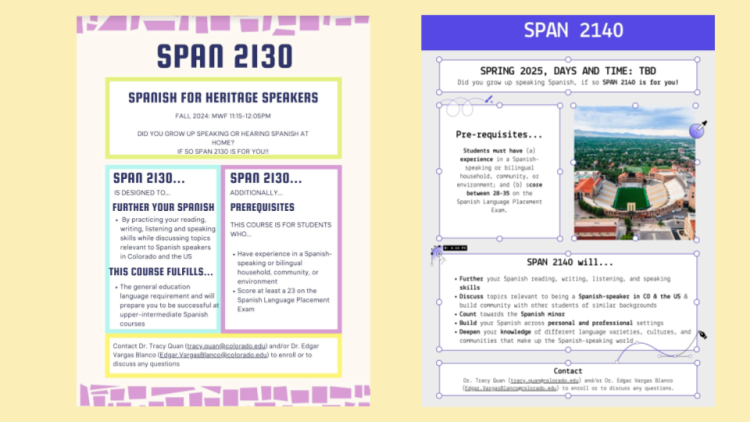Our Interns worked during the Spring Semester with core hosts. Please note that this page will have additional material added:
Angela Peña Deniz and Andrea Lopez Lopez worked as Research Assistants for Dr. Tracy Quan. The project focused on creating a course at CU for Spanish Heritage Speakers. They assisted Dr. Quan with transcribing and coding student and faculty interviews. They provided feedback on the proposed syllabus and the course title. Angela created the flyers promoting these classes. They are both grateful for the opportunity, given that we both identify as heritage speakers.
Ray Eiras
Department of Latin American and Latinx Studies
A Queer Endeavor
Abstract:
This research journey through the intersecting realms of Indigenous Queer history, marginalized migration, and lesbian intersectionality in the Western United States reveals a profound tapestry of identities and experiences. From the rich cultural practices of Indigenous peoples to the complexities of westward migration during the Mexican-American War, and the nuanced dynamics within lesbian communities, the narrative underscores the intricate interplay of race, class, gender, and sexuality in shaping individual lives and collective
histories.
Through the lens of Indigenous Queer history, we uncover the resilience and diversity of Native cultures, challenging colonial impositions and celebrating the fluidity of gender and sexuality across centuries. The exploration of marginalized migration during the 19th century elucidates the complexities of westward expansion, highlighting the hopes and challenges faced by BIPOC and Queer individuals seeking freedom and opportunity amidst the
tumultuous frontier.
Furthermore, the examination of lesbian intersectionality unveils the multifaceted nature of identity, where race, class, and gender intersect to shape lived experiences and
community dynamics. From the struggle against colorism and assimilation to the negotiation of butch and femme identities within predominantly White lesbian spaces, the
narratives of individuals like Virginia Garcia and Cherrie Moraga illustrate the ongoing quest for authenticity and liberation within diverse communities. As we reflect on these narratives, it becomes clear that understanding thecomplexities of identity and history is essential for fostering empathy, challenging stereotypes, and building inclusive communities. By embracing the richness of diverse perspectives and acknowledging the intersections of privilege and marginalization, we move
towards a more equitable and compassionate society, where every individual's story is honored and valued.
Rationale: High School Lesson Plan
It's crucial for students to learn about the cultural belief systems of Indigenous peoples, especially those living on Native American land, to foster understanding and respect
for diverse perspectives. Additionally, exploring gender diversity and acceptance is essential as it reveals that cis-heteronormativity is not inherent but rather a construct influenced by Western religion and colonization. Across the globe, prehistoric evidence suggests engagement in homosexual and gender-Queer activities, underscoring their longstanding presence in human history. Studying Queer Indigenous/Latinx individuals throughout history, particularly in the Southwestern United States, sheds light on the intersectionality of race,
class, and colonialism in shaping their experiences. This knowledge challenges students to critically examine societal norms and fosters empathy for marginalized communities
A Queer Endeavor
Abstract:
This research journey through the intersecting realms of Indigenous Queer history, marginalized migration, and lesbian intersectionality in the Western United States reveals a profound tapestry of identities and experiences. From the rich cultural practices of Indigenous peoples to the complexities of westward migration during the Mexican-American War, and the nuanced dynamics within lesbian communities, the narrative underscores the intricate interplay of race, class, gender, and sexuality in shaping individual lives and collective
histories.
Through the lens of Indigenous Queer history, we uncover the resilience and diversity of Native cultures, challenging colonial impositions and celebrating the fluidity of gender and sexuality across centuries. The exploration of marginalized migration during the 19th century elucidates the complexities of westward expansion, highlighting the hopes and challenges faced by BIPOC and Queer individuals seeking freedom and opportunity amidst the
tumultuous frontier.
Furthermore, the examination of lesbian intersectionality unveils the multifaceted nature of identity, where race, class, and gender intersect to shape lived experiences and
community dynamics. From the struggle against colorism and assimilation to the negotiation of butch and femme identities within predominantly White lesbian spaces, the
narratives of individuals like Virginia Garcia and Cherrie Moraga illustrate the ongoing quest for authenticity and liberation within diverse communities. As we reflect on these narratives, it becomes clear that understanding thecomplexities of identity and history is essential for fostering empathy, challenging stereotypes, and building inclusive communities. By embracing the richness of diverse perspectives and acknowledging the intersections of privilege and marginalization, we move
towards a more equitable and compassionate society, where every individual's story is honored and valued.
Rationale: High School Lesson Plan
It's crucial for students to learn about the cultural belief systems of Indigenous peoples, especially those living on Native American land, to foster understanding and respect
for diverse perspectives. Additionally, exploring gender diversity and acceptance is essential as it reveals that cis-heteronormativity is not inherent but rather a construct influenced by Western religion and colonization. Across the globe, prehistoric evidence suggests engagement in homosexual and gender-Queer activities, underscoring their longstanding presence in human history. Studying Queer Indigenous/Latinx individuals throughout history, particularly in the Southwestern United States, sheds light on the intersectionality of race,
class, and colonialism in shaping their experiences. This knowledge challenges students to critically examine societal norms and fosters empathy for marginalized communities

